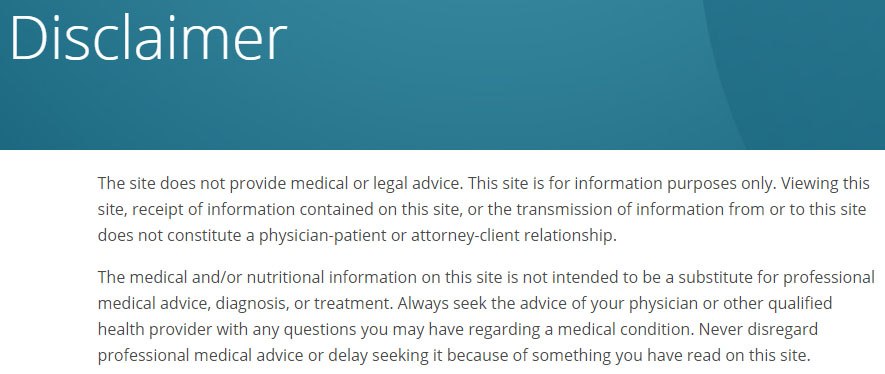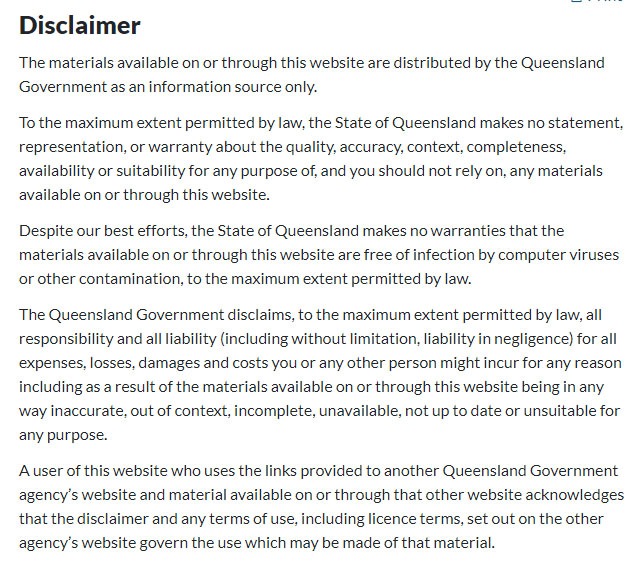Dis cleamer. Disclaimer Generator
Blog Disclaimers
Whether you write about traveling the world, give out makeup tips, or review the most recent action movies as they hit theaters, running a blog is an easy, fun way to share your thoughts with the entire world.
But with that fun comes some serious responsibility. One of your most important duties is to post a proper blog disclaimer that keeps you out of legal hot water.
What's a Blog Disclaimer?
Let's start by clarifying what a disclaimer is.
Simply put, a disclaimer is a written statement that says you're not responsible for certain actions, problems, or outcomes.
For example, if you read an article about heart attacks that was written by a reputable medical organization, you'll see a statement at the bottom that says the information provided in the article isn't meant to replace a trip to your doctor.
Take a look at the disclaimer used by the Physicians Committee for Responsible Medicine:

PCRM makes it very clear that the knowledge they're sharing is strictly for informational purposes. It's not designed to be your diagnosis and treatment plan. Those details have to be taken care of by your doctor.
By having this disclaimer in place, the PCRM won't be liable for what happens if you decide to skip a visit to your doctor and try to treat yourself based on what you've read on the website and things go badly because of that.
A disclaimer like this may seem like such commonsense that it doesn't even need to be said, but when it comes to publishing content on the world wide web, you can't be too careful. You have to do everything possible to limit your legal liability.
So how does this apply to your blog?
There are all kinds of disclaimers that should go on a blog. Depending on what you write about, you may need several specific disclaimers.
In most cases, disclaimers have their own page on the blog, and links to that page can usually be found in one or two places -- in the footer of your blog, or in the sidebar.
Or, if you have a separate Terms and Conditions page on your blog, you can put the disclaimer on there.
No matter where you put them, blog disclaimers need to be written in plain English so that the average reader can understand exactly what you're disclaiming.
What Blog Disclaimers Might Apply to You?
This will of course depend on the nature of your blog, but here are a few of the most common and most important blog disclaimers you may need.
- A disclaimer that mentions your employer
You don't have to mention your employer by name, but you should have a disclaimer that makes it clear that these are your opinions, and not necessarily the same opinions that your employer has. If you're a member of any organizations apart from the company you work for (like volunteer organizations), you may want to extend your disclaimer to them, as well.
- A disclaimer that says your opinions may change
Because you're always adding new content to your blog, you may change your mind about a few older topics. While you certainly have the right to change your mind, let your readers know it's a possibility. That way, they won't be stunned or angry if it happens.
- A disclaimer that says you're not responsible for the comments your readers leave
Great blog posts tend to generate a lot of comments. However, there's no guarantee that all of those commenters are going to share your point of view, or the point of view of other readers. There's also no guarantee that your commenters will say nice things. Since you can't control what someone types, you need to eliminate your liability for what they end up saying.
- A disclaimer that gives you the right to delete comments
While you can't control the content of each comment, you do have the power to delete comments. Make this clear to your readers for two reasons -- so that commenters don't try to take action against you because you deleted their comment, and so that other readers can rest easy knowing that you're going to get rid of comments that they may find offensive.
- A disclaimer that says you're not offering any endorsements
Just because you mention or link to a certain product or service in your blog posts doesn't necessarily mean that you think everyone should run out and buy it. Furthermore, you don't want readers to try to hold you liable if they do buy something they saw mentioned on your blog and it doesn't go well.
- A disclaimer that says you're not responsible for your readers' finances
If your blog offers tips on how to make more money or how to build a more successful business, you need to include an earnings disclaimer. This statement tells your readers that you aren't guaranteeing any kind of income or profit increases.
You also need to take it one step further and point out that if readers do follow your advice, you're not liable for whatever may happen to them or their finances as a result.
While blog disclaimers are serious stuff, there's no rule that says yours has to be boring. As long as it includes all of the necessary details and it's easy for the average reader to understand, you can feel free to be as creative as you want.
You can even inject some humor into the mix. Over at My Happy Crazy Life, this is how Amy Sue explains that she's not responsible for what happens if you make important decisions based solely on her blog:

OK, so you know you need a blog disclaimer. You might even be thinking of ways to make it creative.
But what do you have to say in order to comply with the law of the land where you live?
Laws about Blog Disclaimers
In the United States, The Federal Trade Commission (FTC) is in charge of coming up with regulations for bloggers and their disclaimers.
The FTC created Disclosure Rules for bloggers and social media influencers, and included in those rules are requirements that pertain to disclaimers. Any disclaimers you have on your blog must be "clear and conspicuous" to a reasonable reader. In other words, people have to be able to find your disclaimers without going on a tedious hunt for them.
As part of being clear and conspicuous, the FTC urges bloggers not to use any vague language in the anchor text link to their disclaimer pages.
For example, if you have a link to your disclaimer page in the footer, the link should be titled "Disclaimer" instead of something like "Fine Print." "Fine Print" could mean anything. Even if your readers are trying to find your disclaimers, it may not occur to them to click on a link labeled "Fine Print," which is why this kind of wording violates the FTC's Disclosure Rules.
If your blog disclaimer isn't clear and conspicuous, you could be held liable in court, so be sure yours stands out.
While the FTC doesn't require you to put a disclaimer on every single blog post you publish, they say it certainly can't hurt. That way, your readers will know exactly what you're disclaiming, without having to visit a separate page.
If you're planning on using your blog to promote affiliate products, the FTC requires you to have a disclaimer that explains your relationship to the maker of the product, including the fact that you'll get paid a commission if a reader clicks on your link and makes a purchase.
And finally, the FTC requires that you use an earnings disclaimer if your blog falls into the description that we talked about above.
UK law requires bloggers to post earnings disclaimers under the rules of the Competition and Markets Authority(CMA).
This doesn't just apply to traditional bloggers who are typing out their thoughts, though. In recent years, British lawmakers have specifically mentioned vloggers (people who create video blogs on YouTube or their own personal sites).
In fact, vloggers fall under the jurisdiction of the Advertising Standards Authority. If you post a video that's part of a commercial relationship (ie: a manufacturer paid you to review its newest product), it's considered Non-Broadcast Advertising.
If your blog doesn't have any kind of commercial influence, it's still wise to include some of the disclaimers that we talked about above. After all, being on video doesn't mean you're exempt from legal liability.
Blog disclaimers are important in Canada, too, but they may not hold any legal weight if you don't exercise a duty of care.
In Canadian law, "duty of care" is the legal obligation a person has to adhere to a standard of reasonable care if they're doing anything that may damage or harm others.
For example, if your blog has a disclaimer that says the opinions posted are solely your own and then you post libelous information about someone, you haven't done your legally-mandated duty of care. It's up to you to verify the information before you publish it, because what you publish has the potential to damage someone's reputation.
If one of your readers tries to sue you, they'll first have to prove that you breached your duty of care on your blog. If they can prove that, your disclaimers likely won't be worth a whole lot in your defense.
Under Australian law, blog disclaimers aren't nearly as protective as they are in other countries. Blog owners are certainly encouraged to have disclaimers, but they don't offer absolute protection in court.
Despite the legal differences, there's one thing that applies in each of these countries.
The disclaimer you use on your blog serves a very different purpose from the Privacy Policy you have listed. A Privacy Policy explains what kind of data you collect from your readers and what you do with that data. A disclaimer applies solely to you -- to limit your legal liability. As a result, it's crucial to have both of these posted on your blog.
Need Some Help with the Technical Details?
If you're one of the 74 million people who has a WordPress blog, it's easy to create your disclaimer. You can choose one of the many plugins for disclaimers that WordPress provides.
Or, if you'd rather create a separate disclaimer page yourself AND get it to appear in the footer of every page, you can do a Google search for "How to add a disclaimer to my WordPress site."
When you're done, your blog's footer will look similar to the one that the Queensland Government has:

When you click the Disclaimer link you'll be taken to a pagethat lists all of the necessary disclaimer details:

Take a minute to see just how detailed this disclaimer is. Like the common disclaimers we've talked about, this one addresses the fact that you shouldn't make important decisions based solely on the information they've published. It also notes that information that may be "not up to date."
Just because you need to have the proper disclaimers on your blog doesn't mean you have to invest in expensive legal fees or sacrifice the personality of your blog. Now that you know what's required and what's recommended, you can create proper blog disclaimers that protect your interests.
Comments
Post a Comment
jarvisshukla123@gmail.com